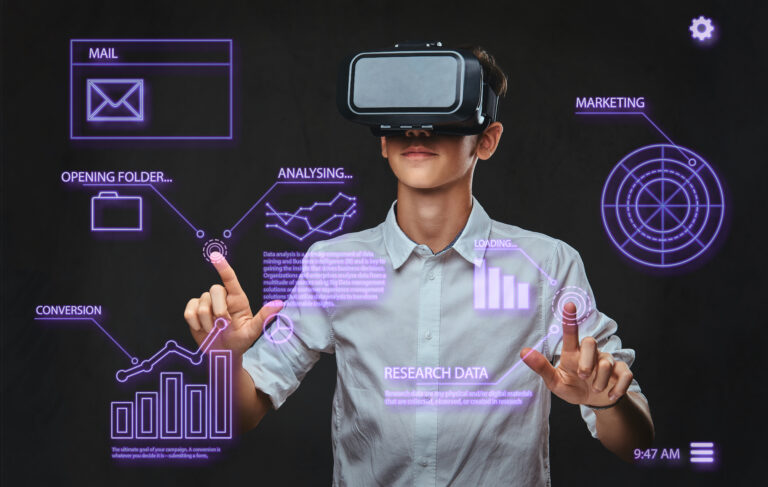Artificial Intelligence (AI) is no longer a futuristic concept or one reserved for research labs – it is already present in our daily lives and revolutionizing the way we live, work and interact with the world. If you haven’t yet asked yourself if you are prepared for this new scenario, this article is for you. Get ready to dive into a universe where technology transforms every aspect of our reality, opening new paths and possibilities for a truly innovative future.
The Revolution That Has Already Begun
We live in an era of rapid and disruptive change, where technology is evolving at a rapid pace. Artificial Intelligence is at the heart of this transformation, redefining sectors as diverse as healthcare, education, finance, marketing and entertainment. But what exactly does it mean to be future-ready? It means being open to new ideas, adopting technologies that optimize processes and, most importantly, adapting to a world where innovation is the only constant.
Imagine a scenario where machines are able to learn from their own mistakes, anticipate needs, and even make decisions based on complex data analysis. This is the essence of AI: a tool that expands our ability to solve problems, improve efficiency, and create previously unimaginable solutions. But how is this technology redefining everything? Let’s explore some of the key impacts and opportunities that AI offers.
The Transformative Power of Artificial Intelligence
AI is a true driver of transformation in many areas. Its algorithms, based on machine learning and deep learning , can analyze massive volumes of data, identify patterns and generate insights that drive innovation. Whether it’s automating repetitive tasks or creating fully personalized experiences, AI is making the impossible possible.
1. Automation and Efficiency
One of the biggest advantages of AI is its ability to automate processes that would traditionally require a lot of time and human resources. From automating administrative tasks to executing complex processes in industries, AI provides:
- Error Reduction: Automated systems minimize human error, ensuring consistency and accuracy in each operation.
- Time Savings: Processes that previously took hours can be completed in seconds, freeing professionals to focus on strategic activities.
- Increased Productivity: With automated operational tasks, teams become more productive and creative, contributing to business growth.
2. Personalization and Tailored Experiences
In a world where consumers expect unique experiences, AI is enabling personalization at scale. Algorithms analyze behavioral data, purchase history, and interactions to provide personalized recommendations and solutions, whether on e-commerce platforms, streaming services, or healthcare apps. Imagine receiving product and content recommendations that feel tailored just for you—that’s the magic of AI-powered personalization.
3. Innovation and New Possibilities
AI not only streamlines existing processes, it also creates new opportunities. In sectors such as healthcare, education and finance, it is enabling breakthroughs that were beyond our reach just a few years ago. For example, deep learning algorithms are being used to accurately diagnose diseases, while in education, adaptive platforms shape learning to the pace of each student. This innovative capability opens the door to solutions that transform the way we live and work.
Impact of AI in Various Sectors
Health and Medicine
In healthcare, AI is revolutionizing diagnostics and treatments. Tools that analyze imaging tests, such as MRIs and CT scans, can detect diseases in their early stages, allowing for more effective interventions. In addition, personalized medicine, which uses genomic data to tailor treatments to each patient, is becoming a reality – all thanks to AI’s ability to process and interpret large volumes of medical data.
Education
Learning has never been so dynamic. AI-powered educational platforms are transforming teaching by adapting content to individual student needs and enabling more interactive and effective learning. Tools that use virtual and augmented reality, combined with AI, create immersive experiences that make teaching more engaging and practical.
Finances
In the financial sector, AI is essential for risk analysis, market trend prediction and process automation. Sophisticated algorithms monitor the market in real time, help identify investment opportunities and automate transactions, increasing the efficiency and security of financial operations.
Digital Marketing
Personalization and automation of marketing campaigns are among the biggest trends in the field. AI tools analyze consumer behavior data to create highly targeted and personalized campaigns, optimizing investments and improving audience engagement.
Industry and Manufacturing
In industry, AI is used to optimize production and maintain quality. Predictive maintenance systems monitor equipment and anticipate failures, reducing downtime and repair costs. In addition, automation of industrial processes increases productivity and ensures high quality standards.
Opportunities and Challenges on the Path to the Future
Opportunities
- Continuous Innovation: AI enables the creation of innovative solutions that transform entire industries. Entrepreneurs who embrace this technology have the chance to lead new trends and stand out in a competitive market.
- Operational Efficiency: Automation and data analysis enabled by AI optimize processes and reduce costs, allowing companies to do more with less.
- Personalization at Scale: The ability to offer unique experiences to each customer becomes a competitive differentiator, increasing customer loyalty and satisfaction.
- Data-Driven Decisions: Predictive analytics and interactive dashboards empower managers to make strategic decisions based on real data, minimizing risks and maximizing results.
Challenges
- Privacy and Security: As data collection increases, protecting user information becomes an ongoing challenge. It is essential that AI solutions comply with privacy regulations.
- Training and Adaptation: The use of AI requires professionals and companies to adapt to new technologies and invest in continuous training. The transition can be challenging, but the long-term benefits are worth the initial effort.
- Cost of Implementation: While automation reduces operational costs, the initial investment in AI technologies can be high, especially for small businesses.
- Transparency and Ethics: Ensuring that AI algorithms are transparent and free from bias is essential to maintaining consumer trust and process integrity.
How to Prepare for the Future with AI
Being future-ready means adapting, learning, and seizing the opportunities that AI offers. Here are some tips for you, as an entrepreneur or professional, to prepare for this new era:
1. Invest in Training
- Courses and Workshops: Take part in online training and courses that cover the fundamentals of AI and its practical applications. Platforms such as Coursera, Udemy and edX offer content ranging from the basics to advanced techniques.
- Communities and Networking: Join AI forums and discussion groups. Exchanging experiences and learning from other professionals can make a difference in your learning journey.
2. Adopt AI Tools
- Automation and Analytics: Explore automation, predictive analytics, and personalization solutions that can be integrated into your business processes. Test CRM platforms, BI tools, and virtual assistants to identify the ones that best fit your needs.
- Experimentation: Don’t be afraid to try new technologies. Many tools offer free trials or demos, allowing you to evaluate their benefits without a large upfront investment.
3. Stay Updated
- Market Trends: Keep up with the latest trends and innovations in AI through blogs, podcasts, webinars, and specialized magazines. Being informed is key to anticipating changes and adapting quickly.
- Interdisciplinary Collaboration: AI is integrating diverse areas of knowledge. Collaborate with professionals from technology, marketing, finance, and other areas to develop solutions that are truly innovative and effective.
4. Adopt a Culture of Innovation
- Foster Creativity: Encourage your team to seek out new ideas and challenge the status quo. Innovation doesn’t happen by accident – it’s the result of an environment that values creativity and experimentation.
- Integrate Technology into Your Business: Don’t view AI as an isolated tool, but rather as an integral part of your strategy. Digital transformation is an ongoing process that must be aligned with your company’s goals and culture.
The Future is Now!
Artificial Intelligence is redefining everything – from the way we interact with technology to the way we conduct business. If you’re ready for the future, now is the time to invest in innovation, skills development and the adoption of technologies that will help you achieve your goals.
Get ready for a world where decisions are made based on accurate data, where processes are efficiently automated, and where personalization creates deep connections with consumers. The future is smart, dynamic, and full of opportunities for those who constantly adapt and innovate.
Don’t get left behind! Start exploring the potential of AI today, transform your processes and open new paths to success. The digital revolution has already begun – and it is ready to multiply your results and transform your reality.







